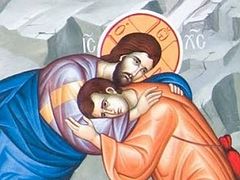In the name of the Father, the Son, and the Holy Spirit.
Greetings with the feast! With the day of the Prodigal Son, who reminds each one of us that we depart from, but by God’s mercy, return to our God, Creator, and Father; to the One Who cannot be compared to anything on earth or Heaven; Who loves each one of us—His sons and daughters. From year to year we hear this Great Gospel passage. St. Ambrose of Milan called this story of the Savior about the Prodigal Son the truly greatest good news, the truest finale of the Gospel. No matter what sins, betrayal, or stupidity a person might commit, for God he nevertheless remains a beloved son or daughter, who will be forgiven if only love would burn in his heart, if he would have an understanding of the Father and a striving toward Him; if he finally comes to himself (as it says in this parable), and has gratitude to the Heavenly Father.
It’s all beautiful in this parable! Even that the man left his father, leaves him, inflicts a wound on him, and betrays him. What is so beautiful about that? It is beautiful for us fallen people—who are the same as that prodigal son—if only because we can recognize the whole horror of mankind’s fall, and each of our falls. Every line in this parable is amazing. Something new is revealed every year. The son announces to his father that he demands a worthy portion of his property and inheritance. Usually an inheritance is given after the death of the parents. This wretched son, just like us when we sink into our own self-love, says in the back of his mind: For me you’ve already died. I am carrying out the desires of my passions—what is opposed to the live-creating commandment of our Father. After this, the prodigal son was a few days with his father—he left a few days later (the parable is silent about this). He demanded that a part of his property be sold. He didn’t leave with houses or things—he left with money, which he demanded of his father from the sale of his property. When the son came to himself, the father saw him from afar—pitiful, trembling from fear that his father would not receive him; and despite all the offenses, wounds, and insults, he ran to meet him, embraced him, and covered him with fatherly kisses. All is forgotten, except for love!
This is the Gospel. This is God in each of us. There is yet another, special part of this parable: “public opinion”, as we would say today. Our Lord Jesus Christ and public opinion are something diametrically opposed to each other. Public opinion dragged Him to judge the harlot. But the Lord judged public opinion and not the sin, which is hateful to God. Hatred and the absence of love, upon which public opinion is built, has from ancient times to our day been loathsome before God. People as a rule dance to the tune of public opinion, not wanting to think or look at themselves; they do not look at God, Who despite public opinion came to the despised Zacchaeus and said, Today I must abide at Thy house (Lk. 19:5). Last Sunday we read about that expresser of public opinion, the Pharisee, and about the victim of public opinion, the publican.
Today the elder son expresses public opinion and the highest human justice: “How can you receive back that man who betrayed you, who took away part of your property and wasted it on harlots?!” We say [in Russian]: the fornicating son. But if we look at the King James version of Gospel in English, it talks about the “profligate”; that is, the same as the Greek original. Only public opinion—the righteous elder son—talks about that wretch’s fornication and shamefulness, about which the father forgot.
Public opinion lifted the Son of God onto the Cross. Public opinion always murders the righteous. Let’ recall the year 1917. Public opinion dictated that even viewing Tsar Martyr Nicholas II with sympathy is disgusting and not worthy of respectable and free people who are striving toward justice. It was okay to insult the Tsar and Martyr Tsaritsa Alexandra because public opinion believed all the fake news about them. Many of our [Russian] compatriots of the time were bowing their heads not before God’s truth, but before public opinion. Only later did we glorify them among the saints, and paint icons of them. But in 1917, a person became a social outcast if he disagreed that the Sovereign, the Empress, their family and friends were disgusting figures who were destroying the country, but considered instead that they were worthy people who were carrying out their duties. At first it was only amongst the intelligentsia, who were the legislators of public opinion, and then many others began to accept not God’s truth, but public opinion. When in July 1918 the murder of the Royal Family was announced, according to the recollections of contemporaries the people uttered these terrible words: “A dog dies a dog’s death!” Marina Tvetayeva remembered that at a tram stop where she was standing, not a single person expressed sympathy when the paper boys ran past them shouting, “They’ve shot the Tsar!” Because it’s public opinion!
The Lord always spoke against public opinion. Not because this was His goal, but because public opinion does not express God’s truth. The prodigal son is the same today as he was a thousand years ago. He will find the Father’s embrace. The Lord Jesus Christ is the same yesterday, today, and for all ages! This is the main good news of the Holy Gospel. The Lord Jesus Christ Himself runs to meet those who run to meet Him.
 Pskov Caves Monastery. Gate Church of St.Nicholas the Gatekeeper
Pskov Caves Monastery. Gate Church of St.Nicholas the Gatekeeper
Remarkable meetings of this kind happen even today. The prodigal son is not necessarily a man who has departed from God. It is a man who sincerely seeks Him and yearns for Him, while living in our ordinary world. In the Pskov Caves Monastery there was just such an incident that happened a year and a half ago. A long time before that, one high-ranking Chinese man who had read Everyday Saints in Chinese came up to me. He said that he was seeking and yearning for God, but he lives like everyone else. He very much wanted to understand just what was this God Whom Orthodox Christians confess. The year before last there was an economic forum held in St. Petersburg, and this Chinese man took part in it. Through his translator Zhenia Markin he called me in the Pskov Caves Monastery; he said that their leader Xi Jingping had left, and they were permitted to remain two or three days in St. Petersburg; he was asking permission to come to the Pskov Caves Monastery. He left early in the morning from St. Petersburg. I waited for him in the abbot’s quarters. The translator phones me from the gates. Now, how long does it take to walk from the gates to the abbot’s quarters? Perhaps about five minutes. Five minutes went by and they had not arrived, then ten, then fifty. What happened? Then our Russian Zhenia and the Chinese man appeared with eyes like saucers, absolutely astounded. The Chinese man had walked first into the St. Nicholas Church [over the gate] that was built during the time of St. Cornelius, in which the service was being conducted in the Chinese language! They said to me in unison, “Batiushka, the service is going on in Chinese!”
Not long before that, a group from the Chinese podvorye in Moscow, where Orthodox Chinese go to church, had come to visit. These Chinese people had asked if they could serve in our monastery. I permitted them, but not in the Dormition Cathedral (because not all our provincial grandmas know Chinese), but in the small church. From point “A” (Peking) to point “B” (the Pskov Caves Monastery) comes a Chinese man seeking God. From Moscow to the monastery come some Chinese Orthodox Christians. And there they meet! I was thinking, what were they doing for fifty minutes? He was in the Father’s embrace! He stood through the service absolutely stunned. And we were stunned, because for the first time in the history of the entire North-West, in an Orthodox church, the Liturgy was being served in the Chinese language. The Heavenly Father had run out (I’m not afraid to use that word) to meet this man, who was shaken to the depths of his soul! The Chinese man asked me whether I had done this on purpose. I replied, “It was done on purpose, but not by me.” He understood everything.
This is how close to us is our Heavenly Father, the Lord Jesus Christ, Who upholds the whole Church in the Holy Spirit. Will we respond to this love with our gratitude to God? Will we respond to Him with our striving to fulfill His commandments, with sincere repentance for all our foolishness that we have committed in this life? Not only will He understand us, He will not even remember our sins. The grace of the Lord Jesus Christ, and the love of God, and the communion of the Holy Ghost, be with you all. Amen (2 Cor. 13:14).





